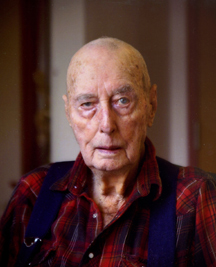
Tonasket’sLew Rider is turning 100-years-old on Saturday,
TONASKET – Lew Rider, turning 100-years-old, looks back on the events of his childhood and work years.
He was born to Sam and Susan Rider who settled in the Pine Creek country to farm and run a small herd of cattle. Four years later his brother, Jim, was born to become a part of the Rider family. Jim was only three weeks old when Sam died of Scarlet Fever, leaving Susan and her sons to survive the best they could.
Susan set her mind to farm on her own with neighbors assisting when they could. In a short time she was broke, losing her herd of cattle and skeleton set of farm machinery, a country life of survival like many of her neighbors.
At age 14, Lew took a job as sheepherder and camp tender for $40 a month. The sheep camp moved on to Idaho and Lew’s wages were raised to $80. His next move was to the Methow. During that move his money was stolen. They moved on to Hidden Lake and then to Ephrata. Lew was convinced there was no future work as a camp tender and herding sheep so he moved home to the upper Okanogan to work for Charlie Eder where his wages were once again $40 a month. As he reflects on those days he said the bill of fare was mostly mutton seasoned with garlic.
Lew renewed his close friendship with Aubre Egerton. Mae, the younger sister of Aubre, was pretty, dainty and had light blonde hair. Their mother was also a widow who lived on a farm. Her sons helped with chores and general farm work. Lew and Mae became attached and soon married. Aubre was a gifted young man succeeding in his attempts to reach his goals. Step-by-step he pulled himself out of a deprived situation, going on to become a wealthy man.
Looking back, Lew could remember accidents just waiting to happen. Part of the young men’s entertainment was “horsing” around with the horses. Once the herd became startled and took off at a high speed. The herd ran over Lew but not one stepped on him, however he was bruised by the flying hoofs. Though his whole body ached, he was grateful for no broken bones.
Hardships were in tune with the economy of the ’20s and ’30s, a test for any man’s iron, but it was not without excitement. Bears ran freely and were a nuisance; they would tear up bedding, car and truck upholstery so they were fair game.
Lew knew he had to make a change and was able to buy a car but he traded it for a truck. At that time, timber was plentiful and closer to mill sites so Lew took advantage hauling as many as five loads to Republic and Omak. He divided his day hauling to both mills. As the timer hauls became longer more roads had to be built. Lew was driving a road grader into steep and muddy roads out of Beaver Canyon up to Pontiac Ridge when the grader tipped, throwing Lew to the ground. The grader fell over, falling on Lew’s leg seriously breaking it and pinning him to the ground. Lester Austin came by and saw Lew’s situation and was able to get him out to take him to the Tonasket Hospital where he spent the next three months. Following the accident, Lew was unable to work for the next seven years. He learned how to get around with crutches striving to get back to his feet again.
He married for the second time, a lady named Virginia, and they combined two little houses, improving to make one and make their home.
A friend in Alaska cut a piece from an Alaskan willow tree. He knew about the beautiful diamond design that was under the bark. He cleared the bark, shined the wood to show the whole strip. Where the diamonds appeared would have been new life limbs, with the dark wood the shape of diamonds and the pale willow as background showing Mother Nature at her best. It had been carefully chosen for a walking stick/cane to support a 180-pound man. Where ever Lew goes, the diamond willow goes also.
As Lew reflects on his many accidents he grins, saying “little did I think I’d ever make it to 100 years.”
With enough memories to fill 100 years, Lew now resides at North Valley Assisted Living in Tonasket.
Dear friends of Lew Rider, you are invited to attend a birthday celebration for Lew in the dining room of the assisted living from 1:30 p.m. to 3 p.m. on Saturday, May 21.



